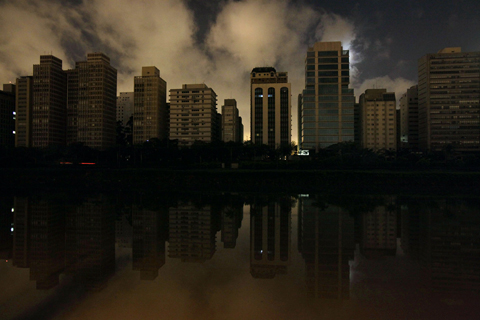A massive power failure blacked out Brazil’s two largest cities and other parts of Latin America’s biggest nation for more than two hours late on Tuesday, leaving millions of people in the dark after a huge hydroelectric dam suddenly went offline. All of neighboring Paraguay also lost power, but for only about 20 minutes.
The huge Itaipu dam straddling the two nations’ border stopped producing 17,000 megawatts of power, resulting in outages in Rio de Janeiro, Sao Paulo and at least several other big Brazilian cities, Brazilian Mines and Energy Minister Edison Lobao said.
He said outages hit nine of the 27 states in a country of more than 190 million people.

PHOTO: REUTERS
The cause of the failure had not been determined, but Lobao said strong storms uprooted trees near the Itaipu dam just before it went offline and could be to blame. Rio was the hardest hit city, he said.
At 12:37am yesterday, the lights in Rio’s Copacabana neighborhood flashed back to life, prompting cheers and thunderous car honking.
“It’s sad to see such a beautiful city with such a precarious infrastructure,” said Igor Fernandes, a shirtless 22-year-old law student pedaling his bike down a dark Copacabana beach. “This shouldn’t happen in a city that is going to host the Olympic Games.”
Lobao said the hydro plant at the dam itself was working, but there were problems with the power lines that carry electricity across Brazil. Brazil uses almost all of the energy produced by the dam, and Paraguay consumes the rest.
In Paraguay, the national energy agency blamed the blackout on a short-circuit at an electrical station near Sao Paulo, saying that failure shut down the entire power grid supplied by Itaipu. All of Paraguay went dark for about 20 minutes, the nation’s leading newspaper, ABC Color, reported.
Itaipu Binacional, the firm in charge of the dam, said the blackout did not start at the hyrdoelectric complex. It said the most likely cause was a failure at one or more points in the transmission system.
The blackouts came three days after CBS’s 60 Minutes news program reported that several past Brazilian power outages were caused by hackers. Brazilian officials had played down the report before the latest outages, and Lobao did not mention it.

Authorities have detained three former Taiwan Semiconductor Manufacturing Co (TMSC, 台積電) employees on suspicion of compromising classified technology used in making 2-nanometer chips, the Taiwan High Prosecutors’ Office said yesterday. Prosecutors are holding a former TSMC engineer surnamed Chen (陳) and two recently sacked TSMC engineers, including one person surnamed Wu (吳) in detention with restricted communication, following an investigation launched on July 25, a statement said. The announcement came a day after Nikkei Asia reported on the technology theft in an exclusive story, saying TSMC had fired two workers for contravening data rules on advanced chipmaking technology. Two-nanometer wafers are the most

DEFENSE: The first set of three NASAMS that were previously purchased is expected to be delivered by the end of this year and deployed near the capital, sources said Taiwan plans to procure 28 more sets of M-142 High Mobility Artillery Rocket Systems (HIMARS), as well as nine additional sets of National Advanced Surface-to-Air Missile Systems (NASAMS), military sources said yesterday. Taiwan had previously purchased 29 HIMARS launchers from the US and received the first 11 last year. Once the planned purchases are completed and delivered, Taiwan would have 57 sets of HIMARS. The army has also increased the number of MGM-140 Army Tactical Missile Systems (ATACMS) purchased from 64 to 84, the sources added. Each HIMARS launch pod can carry six Guided Multiple Launch Rocket Systems, capable of

CHINA’s BULLYING: The former British prime minister said that he believes ‘Taiwan can and will’ protect its freedom and democracy, as its people are lovers of liberty Former British prime minister Boris Johnson yesterday said Western nations should have the courage to stand with and deepen their economic partnerships with Taiwan in the face of China’s intensified pressure. He made the remarks at the ninth Ketagalan Forum: 2025 Indo-Pacific Security Dialogue hosted by the Ministry of Foreign Affairs and the Prospect Foundation in Taipei. Johnson, who is visiting Taiwan for the first time, said he had seen Taiwan’s coastline on a screen on his indoor bicycle, but wanted to learn more about the nation, including its artificial intelligence (AI) development, the key technology of the 21st century. Calling himself an

South Korea yesterday said that it was removing loudspeakers used to blare K-pop and news reports to North Korea, as the new administration in Seoul tries to ease tensions with its bellicose neighbor. The nations, still technically at war, had already halted propaganda broadcasts along the demilitarized zone, Seoul’s military said in June after the election of South Korean President Lee Jae-myung. It said in June that Pyongyang stopped transmitting bizarre, unsettling noises along the border that had become a major nuisance for South Korean residents, a day after South Korea’s loudspeakers fell silent. “Starting today, the military has begun removing the loudspeakers,”